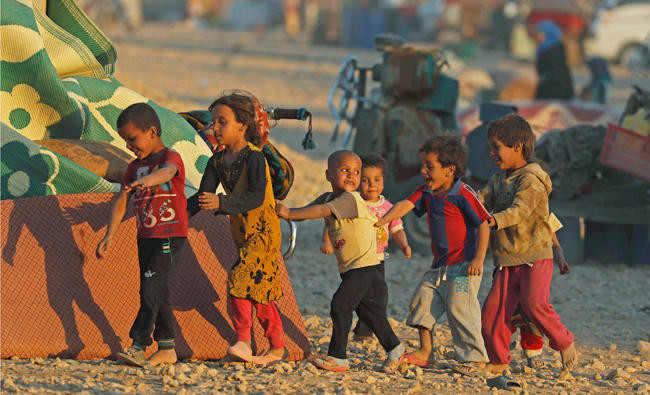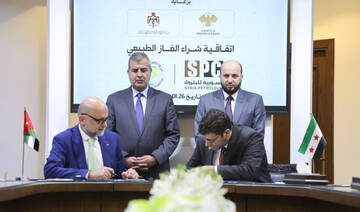GENEVA: War-ravaged Syria is experiencing its worst levels of violence since the battle for Aleppo late last year, the Red Cross said Thursday, warning that the onslaught was causing “intolerable levels of suffering.”
The International Committee of the Red Cross (ICRC) voiced alarm at reports of hundreds of civilian deaths across several regions of Syria, and the recent destruction of numerous hospitals and schools.
“For the past two weeks, we have seen an increasingly worrying spike in military operations that correlates with high levels of civilian casualties,” head of ICRC’s delegation in Syria, Marianne Gasser, said in a statement.
Violence has surged not only in places like Raqqa and Deir Ezzor, where brutal battles are underway to oust Daesh, but also in many so called de-escalation areas, like Idlib, rural Hama and Eastern Ghouta.
The de-escalation zones, agreed upon during talks in the Kazakh capital Astana, contributed to a clear reduction in violence in recent months.
But Gasser warned that “the return to violence is once again bringing intolerable levels of suffering to wide areas of the country, while at the same time decreasing access for humanitarian agencies.”
“Taken together, these are the worst levels of violence since the battle for Aleppo in 2016,” ICRC said.
It pointed out that some camps around Raqqa and Deir Ezzor were receiving more than 1,000 civilians every single day, as men, women, children flee the bombings and battles.
“Humanitarian organizations are struggling to provide water, food and basic hygiene to new arrivals,” ICRC warned.
And in the past 10 days alone, as many as 10 hospitals had been damaged across Syria, “cutting hundreds of thousands of people from access to even the most basic health care,” it said.
Robert Mardini, who heads ICRC’s Near and Middle East operations, stressed that “military operations must not disregard the fate of civilians and of the vital infrastructure on which their survival depends.”
“Winning by any means is not only unlawful, but also unacceptable when it comes at such human cost,” he said, urging all sides fighting in Syria to “show restraint, and to abide by the basic tenets of International humanitarian law.”
Also on Thursday, Russia said its airstrikes in Syria had destroyed a huge underground arms depot belonging to the Hayat Tahrir Al-Sham, a terrorist alliance led by Al-Qaeda’s former Syria affiliate.
“Russian aviation destroyed the largest buried arsenal of Hayat Tahrir Al-Sham near Abu Duhur,” Defense Ministry spokesman Igor Konashenkov said, referring to a town in the northwestern Idlib province.
The munitions depot was hidden underground and contained “more than a thousand tons of weaponry,” he said in statement.
Russia said its aviation destroyed the depot using high power artillery, specially designed to destroy underground targets.
The strikes also killed “49 fighters, including seven leaders of the Al-Nusra Front’s eastern sector.”
Al-Nusra Front was Al-Qaeda’s affiliate in Syria until mid-2016 when it broke off ties, before going on to found a new extremist alliance called Hayat Tahrir Al-Sham, which now controls large swathes of Idlib province.
The statement repeated Russia’s claim on Wednesday to have seriously injured Hayat Tahrir Al-Sham’s leader Abu Mohamed Al-Jolani, saying he was “in a coma” and that this had “thrown the terrorists of the whole Idlib province into disarray.”
The terror alliance on Wednesday denied Russia’s claim, saying that Jolani was in “good health.”
Russia said on Wednesday it had killed 12 leaders of the terrorist coalition including Jolani’s security chief.
The Syrian regime and Russia have carried out heavy airstrikes on Idlib province after a Sept. 18 terrorist attack on its military police deployed in neighboring Hama province.
Syria fighting worst since Aleppo battle: ICRC
Syria fighting worst since Aleppo battle: ICRC

US envoy calls for ceasefire deal in northeastern Syria to be maintained

- Tom Barrack, ambassador to Turkiye and special envoy for Syria, reiterates Washington’s support for Jan. 18 integration agreement between Syria’s government and Syrian Democratic Forces
LONDON: Tom Barrack, the US ambassador to Turkiye and special envoy for Syria, on Monday reiterated Washington’s desire to ensure the ceasefire agreement in northeastern Syria between Syria’s government and the Syrian Democratic Forces continues.
In a message posted on social media platform X, he wrote: “Productive phone call this evening with his excellency Masoud Barzani to discuss the situation in Syria and the importance of maintaining the ceasefire and ensuring humanitarian assistance to those in need, especially in Kobani.”
Barzani has been the leader of the Kurdistan Democratic Party since 1979, and served as president of Kurdistan region between 2005 and 2017.
The current present, Nechirvan Barzani, previously welcomed a recent decree by the Syrian president, Ahmad Al-Sharaa, officially recognizing the Kurdish population as an integral part of the country.
Barrack reiterated Washington’s support for efforts to advance the Jan. 18 agreement between Syria’s government and the SDF to integrate the latter into state institutions. The SDF is a Kurdish-led faction led by Mazloum Abdi that operates in northeastern Syria and recently clashed with government forces.
On Saturday, the Syrian Arab News Agency reported that the Syrian Ministry of Defense had announced a 15-day extension of the ceasefire deal.














